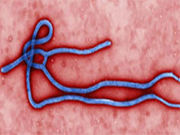Ebola Vaccine Appears Safe, Triggers Immune Response, U.K. Study Finds
Early trial findings echo those from a smaller U.S. study.
Early results suggest an experimental Ebola vaccine triggers an immune response and is safe to use.

However, larger clinical trials in West Africa are needed to determine if the immune response generated by the vaccine is large enough to protect against Ebola infection, said the researchers at Oxford University in the U.K.
This vaccine works against the Zaire strain of Ebola currently circulating in West Africa. It doesn't contain infectious Ebola virus material, so it cannot cause Ebola infection in people who receive it.
The vaccine is being developed by the U.S. National Institutes of Health and GlaxoSmithKline. The first doses of the vaccine for use in large clinical trials in West Africa have been delivered to Liberia.
The Oxford University trial included 60 healthy volunteers who were monitored for 28 days after receiving three different doses of the vaccine. The volunteers will continue to be monitored for six months.
"The vaccine was well tolerated. Its safety profile is pretty much as we had hoped," clinical trial leader Adrian Hill said in a university news release.
"People typically experienced mild symptoms that lasted for one or maybe two days, such as pain or reddening at the injection site, and occasionally people felt feverish," Hill said. "It's very similar to what has been seen in previous studies with this general type of vaccine."
A trial of 20 people in the United States generated similar findings. That study's results were published last November, also in the New England Journal of Medicine.
The Oxford trial is one of several safety trials of the experimental vaccine that have been fast-tracked in the United States, England, Mali and Switzerland.
The Oxford team said it has also started testing an experimental booster vaccine against Ebola to determine if it can enhance the immune response after initial vaccination.
West Africa's Ebola epidemic has slowed significantly, but health officials are hesitant to say the lethal virus is no longer a threat.
Ebola infections have killed more than 8,600 people and sickened 21,000, mostly in the countries of Liberia, Sierra Leone and Guinea since cases first surfaced in Guinea last winter. Infections in all three countries have dropped in recent months, with Liberia experiencing the greatest falloff, the World Health Organization and others have reported in recent days.
Source: HealthDay News
- 356 reads
Human Rights
Ringing FOWPAL’s Peace Bell for the World:Nobel Peace Prize Laureates’ Visions and Actions

Protecting the World’s Cultural Diversity for a Sustainable Future

The Peace Bell Resonates at the 27th Eurasian Economic Summit

Declaration of World Day of the Power of Hope Endorsed by People in 158 Nations

Puppet Show I International Friendship Day 2020

